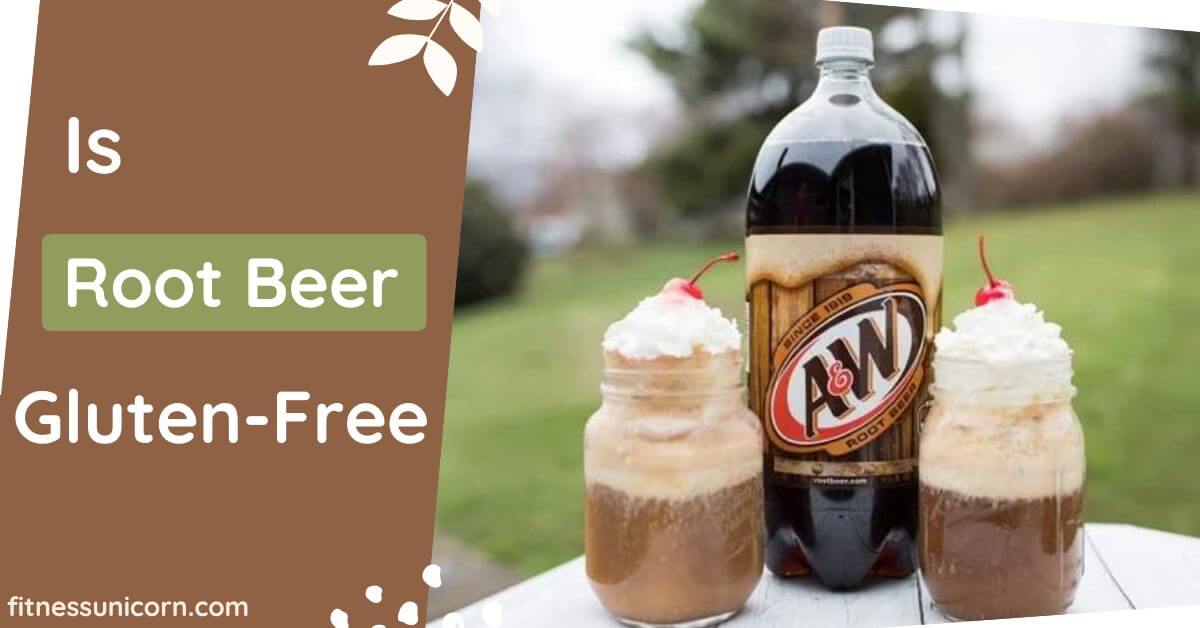Itching for a refreshing root beer from A&W to pair perfectly with your evening snack? Worried about the ‘hidden’ ingredients in things like soda?
Gluten has become recognized much more prominently as a problematic allergen in recent years, but it can still be incredibly difficult to determine what foods and drinks actually contain gluten in them – especially for those eating out at restaurants.
Anyone can request gluten-free burger buns, and things on the menu like fries are obvious ‘gluten-free’ options, but what about something like root beer? Is root beer truly gluten-free?
Yes, generally, root beer is indeed gluten-free. While gluten can seemingly hide in any sort of food product or drink, like most sodas, root beer is naturally gluten-free as well.
The importance lies in checking specific brands – formulations can change between one company to another, and some corporations may use ingredients or natural flavoring that is derived from gluten, or which has come in contact with gluten.
This is often referred to as “cross contamination,” and the reasoning behind why people with Celiac Disease or gluten intolerance react to things like oats that do not naturally contain any gluten.
In this article, we will further explore what root beer is most frequently made from (mostly carbonated water and sugar, with flavoring), what gluten actually is, and how to spot potentially problematic ingredients that may contain gluten – whether in a restaurant or a grocery store.
Not all root beer is created equal.

What Is Root Beer Actually Made From?
Traditionally, like most sodas, root beer is typically made from carbonated water, sugar (or glucose-fructose), flavoring, and preservatives.
Very few soft drinks contain any traces of gluten, and if they do contain wheat or wheat-based ingredients, they would be labelled explicitly as allergens on the bottle or can.
While you might not see the gluten-free label plastered on the outside of the can or bottle, most of the major corporations like Coca-Cola and Pepsi-Co ensure the products are safe for those with Celiac Disease so as not to cut this large demographic out of the market.
Root beer comes under a little more scrutiny than most sodas because it has a tendency to contain a number of added flavors and colorings – added to give it that rich, dark taste and appearance.
A&W’s root beer lists the following ingredients: carbonated water, sucrose, high fructose corn syrup, caramel color, natural and artificial flavors, sodium benzoate, phosphoric acid, red 40.
Similarly, “Mug” root beer lists the following: carbonated water, high fructose corn syrup, caramel color, sodium benzoate, citric acid, natural and artificial flavor, calcium disodium EDTA.
Both of these ingredient lists are confirmed to be gluten free by the companies, and when checking online, you will see most root beers contain a similar assortment of ingredients.
The concern lies in the “natural and artificial flavoring” and things like “caramel color,” which could potentially be derived from wheat or barley.
These additives have caused a lot of stress for people wondering if that can of root beer is really safe for them to drink.
More on these problematic additives will help better clear up the fear among consumers looking to avoid gluten – but first, let us actually explain what gluten is and if you need to be avoiding it if you do not have Celiac Disease or a gluten-intolerance.
RECOMMENDED: Are Reese’s Puffs Gluten-Free?
What Is Gluten? Should I Avoid It?
So, what is gluten, actually? Gluten is used as a very broad and general term for the complex of proteins specifically found in wheat and wheat-related grains.
Most people have likely heard the phrase ‘gluten-free’ by now, but many are still blissfully unaware as to what gluten is all about. Shall we?
As we mentioned, gluten relates to the proteins found in wheat and wheat-related grains, which includes everything from durum wheat semolina (often used to make pasta) to rye, barley, farro, farina, spelt, triticale, and emmer.
You do not need to be familiar with all of these varieties of wheat to understand that essentially any grain that is not specifically marked or indicated as ‘gluten-free’ on the packaging has the potential to contain gluten, or be “cross-contaminated” with gluten.
For most people, this is not a problem – as we have consumed breads, baked goods, cereals, pastas, and soups containing these grains for over 10,000 years.
Part of the issue lies with a lot of modern food production processes.
Current wheat crops have been bred to have an especially high gluten content, as this is desirable for leavened bread, the perfect consistency of pasta, and that ‘rise’ we get in dough and baked goods.
However, a higher gluten content means more of the problematic proteins in wheat that can cause people allergies and intolerance – just as people have digestive upset from milk and cheese due to the ‘casein’ protein found in dairy.
This means that current wheat crops may be more inflammatory and allergenic than those in the past.
For those without Celiac Disease or gluten-intolerance, gluten does not need to be avoided.
“Celiac Disease” is an autoimmune disorder that results in the body attacking itself upon consumption of wheat or gluten containing grains. As a result, gluten damages the intestines from immune cells in the body attacking it.
Damage to the small intestine can result in “intestinal permeability,” which can lead to a whole host of health issues including vitamin deficiencies, infection, and gastrointestinal disorders.
Some find that they feel better physically when avoiding gluten in terms of their digestive health.
Whole grains are an important part of a healthy diet and lifestyle, and should not be avoided by those who tolerate them well – but those with Celiac need to be especially careful in terms of consuming any food or beverages with gluten or contaminated with gluten.
READ MORE: BEST Gluten-Free Bakeries in Nashville, TN
Are There Any Ingredients I Should Be Wary of in Root Beer?
Most of the ingredients on any ingredient list for root beer will quite obviously be gluten-free by nature – carbonated water, sugar, glucose-fructose, high-fructose corn syrup, and preservatives like sodium benzoate or calcium disodium are 100% gluten-free.
The concern arises with more questionable or unclear ingredients like caramel color, modified starch, or barley malt extract.
Barley malt extract can be ruled out right away – if you see this on the label or ingredients list for any root beer, it is absolutely not gluten-free.
That being said, the vast majority of root beer is no longer made the ‘ol fashioned way and does not contain barley malt extract.
Instead, natural flavorings and colorings are used to give root beer that dark, rich flavor and color. Things like caramel color may concern people, but fear not!
Caramel color is most assuredly gluten-free, as it is now derived from corn or glucose (sugar) and not wheat or barley.
Similarly, “modified starch” is often not contained in current root beer products.
Even when it is, it is not a cause for alarm, as companies currently use cornstarch as it has a much longer shelf life, is a less common allergen, and makes for a superior product.
Not only are these additives highly processed, but they contain no gluten to begin with – the origin is often corn or sugar.
FIND MORE: Are Now & Laters Gluten-free?
Which Root Beer is Considered Gluten-Free?
A quick Google search around the internet yields many conflicting reports on gluten in root beer products – so it can be hard to actually determine what might contain gluten, and what is assured to be gluten-free.
Not all brands of root beer contain gluten, not even close. Which root beer is gluten-free?
As we mentioned previously, most root beer is gluten-free, and concern only arises when brands add ingredients or flavorings that may be derived from wheat or come into contact with wheat.
After a deep dive scouring the internet on root beer, it appears that the following root beer brands are considered gluten-free, as confirmed by the companies themselves.
- A&W Root Beer – Gluten-Free
- Barq’s Root Beer – Gluten-Free
- Blue Sky Root Beer – Gluten-Free
- Bulldog Root Beer – Gluten-Free
- Dad’s Root Beer – Gluten-Free
- Faygo Root Beer – Gluten-Free
- Jones Soda Root Beer – Gluten-Free
- Mug Root Beer – Gluten-Free
- Santa Cruz Root Beer – Gluten-Free
- Zevia Root Beer (Sugar-Free) – Gluten-Free
Drink Up, Gluten-Free Root Beer Lovers
Any company that cannot confirm their ingredients or sourcing of their ingredients should be avoided.
Concerns are frequent that the following ingredients are contained in many root beers as a hidden source of gluten contamination: caramel coloring, barley malt extract, and modified starch.
However, most companies no longer use barley malt extract as a sweetener, nor do they use modified starch or caramel coloring derived from gluten or gluten-containing grains like barley.
Those that use modified starch often use corn now to account for gluten allergies, and caramel color is almost always gluten-free.
Again, corn or glucose are used in place of wheat or barley to avoid the use of potentially problematic gluten in commonly consumed products – these companies are aware of the growing concerns for those with gluten allergies, Celiac Disease, or intolerance.
Most commercial root beer sold in grocery stores, or available in restaurants is, in fact, gluten-free.
The only concern with restaurants is how they handle food and drinks while coming into contact with other gluten-containing products, so it’s best to contact a restaurant directly to find out more info depending on the severity of your reaction to gluten.
These root beers that are indicated as gluten-free also apply to those carried in fast food chains and restaurants, be it bottled or from a machine, so drink up, gluten-free root beer lovers.

